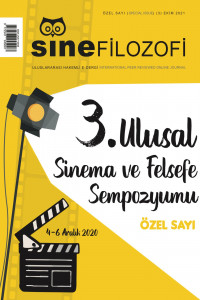Ontolojik Yaklaşımda Mahallenin Fragmanına Sultan Filmi Üzerinden Bakmak
Looking at the Fragment of the Neighborhood Through Sultan Film in Ontological Approach
Author(s): Arzu Yılmaz AslantürkSubject(s): Gender Studies, Rural and urban sociology, Film / Cinema / Cinematography, Sociology of Art, Ontology
Published by: Serdar Öztürk
Keywords: Daily Life; Ontological Approach; Slum; Urban Modernity;
Summary/Abstract: The Sultan movie made in 1978, which is discussed in this study, offers a sociologically versatile perspective to the crisis of urban modernity and the resistance of its inhabitants with its story that tells the daily life taken by the neighborhood’s pulse in all its reality. In addition to benefit from the discipline of sociology in the analysis of the film, philosophy has been applied to think ontologically on the lives created in the film. The reason for this is that social thought is at the root of the philosophical systems of philosophers and that these thoughts that develop cumulatively form the background of sociology. Therefore, the sociological pathway of the fragment of the neighborhood is questioned by various philosophical views. The relationship between space and society, which forms the fragment of the neighborhood, takes on an ontological structure by feeding into daily life. Thus, human relations, love, affection, and sadness, which constitute ascribed areas of daily life, form the philosophical basis of the slum in the ontological sense. Space is an important element in the theme of Yavuz Turgul films, who can’t remain insensitive to social problems. The main purpose of the study is to analyze the struggle of the slum from the urban rent in the perception of space produced by capitalism, the meaning of the existence of the individual in the chain connected with the neighborhood which is through their sadness, love, joy and struggles to earn a living in the flow of daily life. The theoretical framework that Henry Lefebvre put forward regarding the production of space will be discussed with an ontological approach. Daily life, arabesque, advertising, and neighborhood culture as the urban manifestation of collective consumption are the focus of the study. Also, spatial unity, masculine domination, emotional attachments, and joint interests of the neighborhood’s spaces will be evaluated through the characters represented by the neighborhood.
Journal: SineFilozofi
- Issue Year: 6/2021
- Issue No: Sp. Iss.
- Page Range: 455-471
- Page Count: 17
- Language: Turkish

